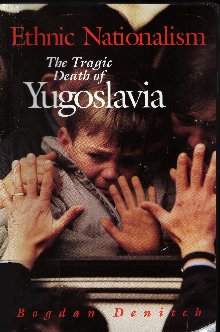
Bogdan Denitch, Ethnic Nationalism. The Tragic Death of Yugoslavia
(University of Minnesota Press, Minneapolis, London, 1994)
Do you want to buy this book with Amazon? Click Here
Summary: The book recounts briefly the history of Yugoslavia and the conftlict, especially in Croatia 1991-1992. His focus is stronger than among other authors on class and economic factors. He strongly opposes the view that the conflict was the cause of "ancient hatreds." He maintains that the destruction was not inevitable, but rather the result of deliberate anti-Yugoslav politics of the country's leaders.
He concludes the book with a somewhat lengthy autobiography, describing his personal involvement as Serb in America and Croatia.
Evaluation: The book contains some points view which are rarely found among other works on the topic, making it a worthwhile reading. It nevertheless remains superficial at times and contains some factual mistakes.
Author: Bogdan Denitch is professor at CUNY. He is of Yugoslav (Serb) origin, living in the United States and Croatia.
Some of the Main Points:
The German and Austria recognition of Slovenia and Croatia was inconsiderate in the light of historical experience and as it lead to war in Bosnia. German depiction of Serbia was racist.
Why should Serbia and Montenegro have been excluded from international bodies. Even Pakistan, which fought bitterly against seceeding Bangaladesh did not loose its seat in the UN.
The identity promoted by the Communist party of Yugoslav worker was too general to attract mass support and supplant national identity:”National identity...could generate mass loyalty, particularly with the growing secularization of political faith in socialism and Marxism.” (p.55)
The absence of a legitimate arbiter, as Tito in the Croatian Spring 1972, was absent in the 1980s to reduce nationalism. The purges of the early 1970s not only eliminated the liberal Croatian, but other liberals as well, which successfully co-operated with each other. Instead the next generation was dogmatic and not cooperating well with each other. The crackdown on liberals was the beginning of the legitimization of Titoism: ”It was not along step from that informal symbiosis between local Communist politicians and local interests to an open appeal local Communist leaders to nationalism. Such an appeal was based on the claim that they, the Communists, most effectively represented national interests and demands, particularly as against competing national demands and againt the federal center.” (pp. 61-62)
Had Tito retired in the early 1970s, he could have become the Atatürk of Yugoslavia. He was the last Habsburg. His friendships in the thrid world and communist world prevented a progress democratic policy
The escalation to war was not a deliberate attempt to wage war, but rather an escalation of demands and a grab for power from which neither side wanted to step down. Incompetence and miscalculations also contributed to the conflict.
The political leadership of the republics destroyed Yugoslavia, with the help of the army, ”democratic” opposition, LCY’s in Croatia and Serbia through cowardice, incompentence and the inability to change habits.
The war was a
1. Civil War of Croatia and rebel Serbs,
2. YNA against Croatia,
3. Nationalist aganist nationalist Croatia,
4. A postmodern ”war of particularisms against reality and imagery of an orderly if repressive modern society.”
Serbian emigration from Kosovo is much like ”white flight” in the US. Leaving a society which they sees as more backwards than they are.